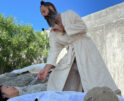
From Slow to Go

By Matthew B. James, MA, Ph.D.
Considering the pace of life and work today, it’s no wonder many people feel low energy, tired and sleep-deprived. We live in the world of BlackBerrys, iPads and instant-everything. Many of us are expected to be “on” all the time and available to work 24/7.
Compound this with the fact that the idea of a real vacation is virtually nonexistent. On my last vacation, I answered emails and participated in a conference call. Your life is probably the same way.
We think we’re getting more done, but what we’re actually doing is keeping our brains on longer than our computers. Rather than taking the time to “reboot” them, we just keep going. The result: productivity goes down. And it may be taking a toll on our health. If you feel rundown, your immune system probably is, making you more at risk to get sick. So what is the answer?
Here are some ways to feel refreshed and recharged:
Take a Break: Every 90 minutes, take the time to step outside and take a break for 10 or 15 minutes. If you can’t go outside because of the weather or other factors, try staring out the window or at a calming picture while taking long breaths.
Change Your State of Mind: The goal is to switch your brain for a few minutes from the busy beta wave state to an alpha state, the state that precedes sleep. When we sleep we go into this state about every 90 minutes. This allows the body to slow down and the brain to regenerate. When we are awake, our brains also cycle from beta into alpha roughly every 90 minutes. But in our go-go-go world, we fight it by grabbing an energy drink, another cup of coffee or a chocolate bar. It’s like a computer slowing down. Every 90 minutes, your brain needs a gentle reboot. And it only takes 10-15 minutes.
Try a light meditation: There are five steps to Hakalau, this Hawaiian-form of meditation:
1. Pick a spot on the wall to look at, preferably above eye level, so that your field of vision seems to bump up against your eyebrows, but not so high as to cut off the field of vision.
2. As you stare at this spot, just let your mind go loose, and focus all of your attention on the spot.
3. Notice that within a matter of moments, your vision begins to spread out, and you see more in the peripheral than you do in the central part of your vision.
4. Now, pay attention to the peripheral. In fact, pay more attention to peripheral than to the central part of your vision.
5. Stay in this state for as long as you can. Notice how it feels.
These techniques can be very helpful for restoring energy, but should not be used as a substitute for sleep. Remember that every so often you need to take a true day off, without answering emails or phone calls. Spend that time doing what you love. Then you can think about those moments the next time you take breaks at work to reboot your brain.
Matthew B. James, MA, Ph.D., is President of Kona University. His new book, The Foundation of Huna: Ancient Wisdom for Modern Times, details forgiveness and meditation techniques used in Hawaii for hundreds of years. He carries on the lineage of the one of the last practicing kahuna of mental health and wellbeing. To reach Dr. James, please email him at [email protected].
Recommended
-
5 Skin Care Trends: What Profe...April 10th, 2024
-
Is It Time To Change Your Rela...March 20th, 2024
-
Resilience & Transformati...February 20th, 2024
-
Medical Malpractice Lawsuits: ...October 31st, 2023
-
Be Here Now—Two Easy StepsSeptember 19th, 2023















